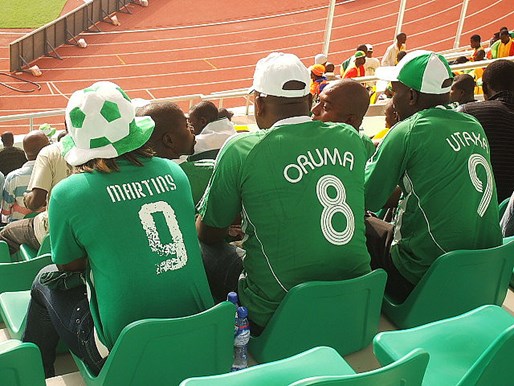Players give back, officials eat: The two faces of Nigerian football

Corruption is ripe in Nigerian soccer. Still, FIFA gave Nigeria three days to withdraw its investigation or face a ban. Photo (c) flickr user nova3web and licensed under a Creative Commons 2.0 licence.
20.10.2010
By Olukayode ThomasNwankwo Kanu, who currently plays for England’s Portsmouth Football Club, has paid for heart surgery for hundreds of Nigerian kids with heart problems. Kanu also employs hundreds at his hotel, Hardley Suite, in Lagos, his bottled water manufacturing company, transport, real estate and other businesses.
Austin Okocha, who played international soccer for 16 years for German, English, French and Turkish clubs before retiring, helps orphanages. Several children’s homes have benefited from his yearly donations in cash and kind. Now back in Nigeria, Okocha controls enterprises that range from entertainment, real estate and other businesses employing scores of Nigerians.
John Obi Mikel was born and bred in the slums of Jos, a city in the Northern part of Nigeria. Today, football has not only turned Mikel into a millionaire, but many of his childhood friends and members of his community in Jos are now self-employed thanks to Mikel’s generosity. Many have also been given scholarships.
Virtually all former Nigerian players in Europe and those currently playing employ thousands of Nigerians and embark on developmental programmes in their communities.
But the same cannot be said of the officials. Though Nigeria has a population of about 150 million that is passionate about football, several good stadiums and talented players, football suffers.
International Football Association (FIFA) and Confederation of African Football (CAF) executive board member, Amos Adamu, who ran Nigerian football in recent years, has ruled over a situation in which Nigerian football clubs were able to access only about 10% of the US $7 million yearly donated to them by their sponsor, Globalcom. The rest has stayed with the officials on the board of the Nigeria Premier League. Television rights for the Nigerian league are worth about US $5 million, but since this deal was signed a couple of years ago, none of the clubs in the premier league have seen any of this money either.
Many clubs have complained about this situation, saying that they cannot possibly pay their players and staff like this, but the status quo remains.
Just before the current World Cup Nigeria Minister of Sports, Ibrahim Isa Bio had to bail out the national team, the Super Eagles. The Nigeria Football Federation (NFF) had hired the US $100 a night Hampshire Hotel in the South African coastal town of Ballito for the team, whilst the federation was getting US $400 per person per night from FIFA for this purpose. With two players expected to stay in a room, the officials stood to make about US $700 on each room. The Minister quickly organized a better hotel for the team.
Before the hotel affair, the NFF was also involved in a scandal over an agreement with Glenn Hoddle, the former England coach. Hoddle had signed an agreement to coach the national team. The deal was worth US $1 million but an official had told him it would be announced as US $1.5 million. Hoddle rejected this and went public.
Lastly: recently about US $250 000 in cash was said to have gone missing from the coffers of the NFF, with nobody, reportedly, having any clues to the money bags’ whereabouts.
When Nigeria was knocked out in the first round in 2010, Nigerian President Goodluck Jonathan was so disappointed that he suspended the national team from all international competitions for two years and ordered an audit. He was supported by Rivers State governor Rotimi Amaechi, who headed the presidential task force on the 2010 World Cup, as well as by former Nigeria soccer star John Fashanu. “We went to the World Cup and found all sorts of problems and we felt we should sit back and look inward,” Amaechi said, explaining the Nigerian government’s decision.
But this was not to be. FIFA gave Nigeria three days to withdraw its decision or face a ban from the soccer governing body. FIFA communications director, Nicolas Maingot, said the FIFA ban would not only cover the national team but club matches in African competitions, referees as well as the cash that flows from FIFA to national associations. This included the US $8 million that was due to Nigeria for participating in the first round of the World Cup.
Ironically, the man who was sent by FIFA to present the full picture and weight of the FIFA threat to President Jonathan was Amos Adamu, whose cronies still run the Nigeria Football Federation.
This article was first published in the report "Killing Soccer in Africa" from the Forum for African Investigative Reporters (FAIR), but has been republished on Play the Game's website with kind permission from the author.
Read more about the report here





